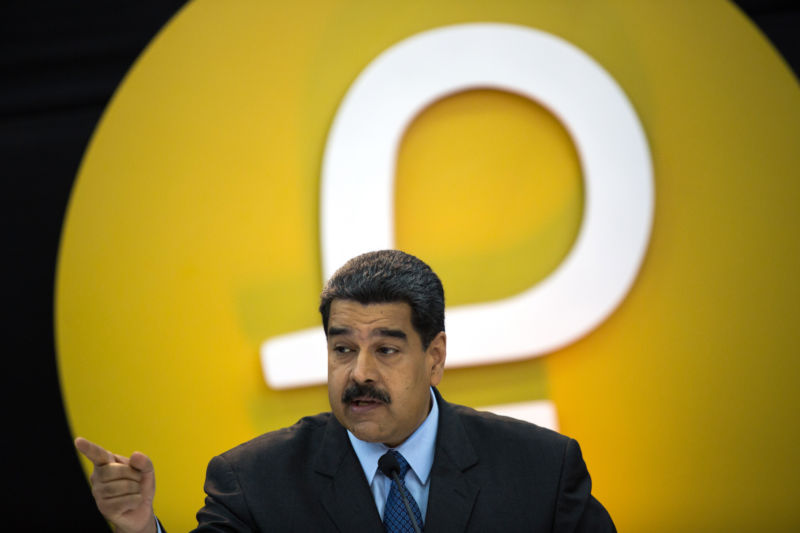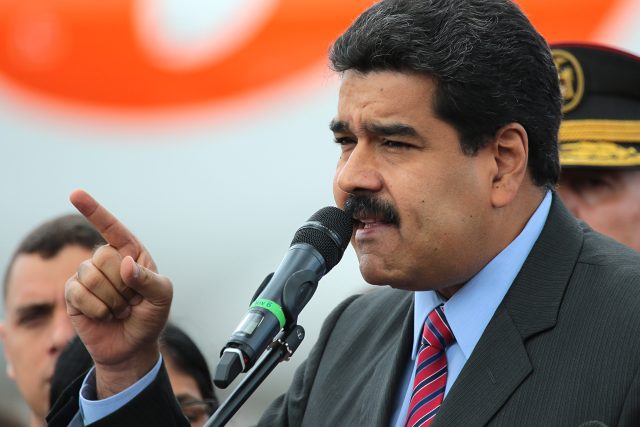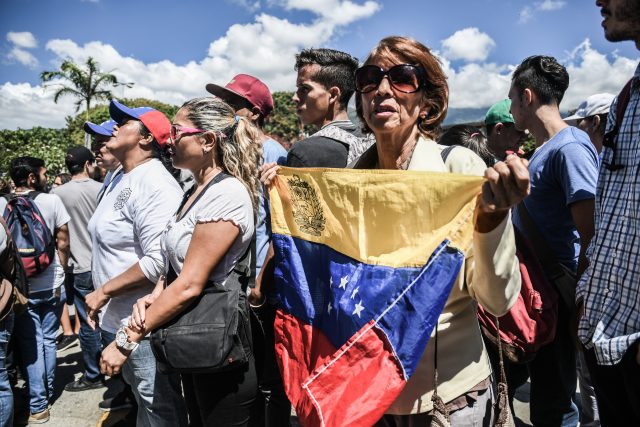
Venezuelan President Nicolás Maduro claims a new state-sponsored cryptocurrency called the petro raised $735 million on Tuesday—its first day on sale. But the government hasn't provided any way to independently verify that $735 million figure. And there's reason to doubt almost everything the Venezuelan government has said about the project.
The presale was a disorganized mess, with basic technical details still being worked out after the sale supposedly began. The petro network itself hasn't launched yet—allegedly that will happen next month—and the government has hardly released any information about how it's going to work.
Moreover, there's little reason to believe that the petro will maintain its value over time. The Venezuelan government has portrayed petro tokens as backed by Venezuela's vast oil reserves, but they're not. The government is merely promising to accept tax payments in petros at a government-determined exchange rate linked to oil prices. Given the Venezuelan government's history of manipulating exchange rates, experts say investors should be wary of this arrangement.
Moreover, the petro scheme has been opposed by opposition legislators in Venezuela's opposition-controlled legislature. They say that the Maduro government is essentially issuing oil-backed debt, and legally that can't be done without approval from the legislature. If Maduro falls from power in the future, his successor might refuse to honor petro redemptions.
In short, it's hard to see why anyone would be in a rush to buy petros. And that makes us skeptical that the Venezuelan government has really sold $735 million dollars' worth of them—or that they'll get much interest in the future.
Venezuela wasn’t close to ready for its presale
Venezuela hopes to sell 82 million units of petro in a two-phase process. The first phase, which officially started on Tuesday, is a pre-sale. In this phase, people can supposedly purchase tokens representing 38.4 million petro ahead of the official launch of the petro blockchain.
Later, once the petro network has officially launched, people will allegedly be able to swap these tokens for actual petro. At this point the Venezuelan government will conduct an initial coin offering in which people can purchase another 44 million units of petro.
So which blockchain will host those pre-sale tokens? Incredibly, the Venezuelan government was still figuring this out as it "launched" the petro presale on Tuesday morning. We downloaded a copy of the official petro white paper on Tuesday afternoon that said that the presale will "start on February 20, 2018, and will consist of the creation and sale of an ERC20 token on the blockchain Ethereum platform." ERC20 is a popular standard for Ethereum-based tokens.
But by Wednesday afternoon, all mentions of ERC20 had been scrubbed from the white paper. A new version of the paper stated that the presale will "consist of the creation and sale of smart-asset on the NEM blockchain platform." NEM is a lesser-known blockchain project that's designed to facilitate trading of virtual assets.
Deciding which blockchain to use—Ethereum or NEM—should have been one of the first decisions the Venezuelan government made. That should have been followed by weeks of testing to make sure that the platform was ready to accept payments and distribute tokens. Instead, the government was still deciding on the technical foundations for the presale hours after it supposedly began offering tokens for sale to the public.
So far, it doesn't appear that any tokens have actually been distributed. Someone—perhaps the Venezuelan government—has created some petro tokens on the NEM blockchain. There are 38.4 million units of this "petro.presale" token—exactly the number of petro units the government has said would be offered in the presale.
In a conventional token sale, customers would send in other cryptocurrencies—usually bitcoins or ether—and receive tokens in exchange. But the NEM blockchain doesn't show any transactions involving petro tokens. Their creator—presumably the Venezuelan government—still has all 38.4 million of them.
Of course, it's possible that Maduro has obtained private promises from potential investors to purchase $735 million dollars' worth of petro. But it looks like so far, those promises are just promises—no actual tokens have changed hands as of this writing.
Maduro’s claims about petro don’t add up

Setting up a token sale using an existing blockchain is easy compared with launching an entirely new blockchain from scratch. The petro white paper states that "the presale token will not be part of the petro network until petro distribution during the Initial Offer process"—suggesting that there will be an independent petro network not built on Ethereum or NEM. But the white paper has essentially no details about how this network will work or how much progress the Venezuelan government has made in creating it.
Maduro tried to bolster the project's credibility by claiming the endorsement of the NEM Foundation, the non-profit organization that oversees the NEM blockchain, and claiming a photo showed a meeting with NEM Foundation officials. But the NEM Foundation immediately poured cold water on that claim.
"The NEM Foundation abstains from political endorsements," the organization tweeted in response to Maduro's claim. "The NEM Foundation isn’t involved nor is the NEM Foundation in this photo," a NEM spokeswoman added.
Maduro also claimed a deal with Aerotrading, which he described as "one of the largest blockchain companies." This left blockchain experts scratching their heads, as it's not a widely known company, and there's hardly any sign of its existence online. There is an @aerotrading Twitter account, but its first tweets occurred this week, and they're all about the petro project. That account points to a website that claims to be "the biggest blockchain consultancy company" but doesn't have any information about where the company is based, who runs it, or what products it offers.
Presale purchasers have reason to worry that there might never be a petro network. This kind of thing has happened before. Tezos held one of the largest ICOs in history last year, raising $232 million. But the Tezos project has now degenerated into chaos, with the project's founders locked in litigation with the foundation that is supposed to oversee the project. The network's launch is months behind schedule, and it's unclear if it will ever get off the ground.
The Venezuelan government has provided even less information about how the petro network will work than the Tezos team did before its launch. And the petro's chaotic presale raises serious questions about whether Venezuela has the capacity to design and launch an independent blockchain network.
The Venezuelan government’s credibility is low

Even assuming that Venezuela eventually figures out how to launch the petro network, the larger question is whether people can trust the Venezuelan government to honor its commitment to peg the value of petros to the price of oil. One expert, Johns Hopkins University economist Steve Hanke, told Ars that the government has "no credibility whatsoever" when it comes to currency values.
"You're not going to be able to go to the state-owned oil company and say 'we have a bundle of these petros and we want to exchange them for oil,'" Hanke said.
In its white paper, the Venezuelan government promises to accept petro for tax obligations, and to do so at the current exchange rate between oil and the bolivar, the currency of Venezuela.
The problem, Hanke says, is that Venezuela has a history of setting official bolivar exchange rates that are far out of line from the bolivar's market value. If the Venezuelan government wants to devalue the petro, it can use an inflated value for the bolivar—something it already does in other contexts. Hence, there's no reason to think the petro will remain linked to a barrel of oil in international markets.
And the launch of the petro comes in the midst of a severe economic and political crisis. Maduro's socialist policies have pushed the Venezuelan economy to the brink of collapse. Refugees have flooded into neighboring countries amid worsening shortages of food, medicine, and other necessities. Venezuela's government is deeply in debt, and it defaulted on some of its obligations back in November.
In short, there are lots of reasons to doubt Venezuela's promise to keep the petro's value linked to the dollar. Venezuela could repudiate the petro during its next debt crisis. Venezuela could repudiate the petro when opposition leaders—some of whom have denounced the project as illegal—take power. Venezuela could effectively default on its petro obligations by choosing an exchange rate between oil and bolivars that is far out of line with market realities.
And there's one extra danger for Americans who are thinking about buying petros. Venezuela faces sanctions from the US government that limit Americans from doing business in Venezuela. A statement on the Treasury Department's website warns that "US persons that deal in the prospective Venezuelan digital currency may be exposed to US sanctions risk." That's because buying petro "would appear to be an extension of credit to the Venezuelan government"—something that isn't permitted under US law.
reader comments
82